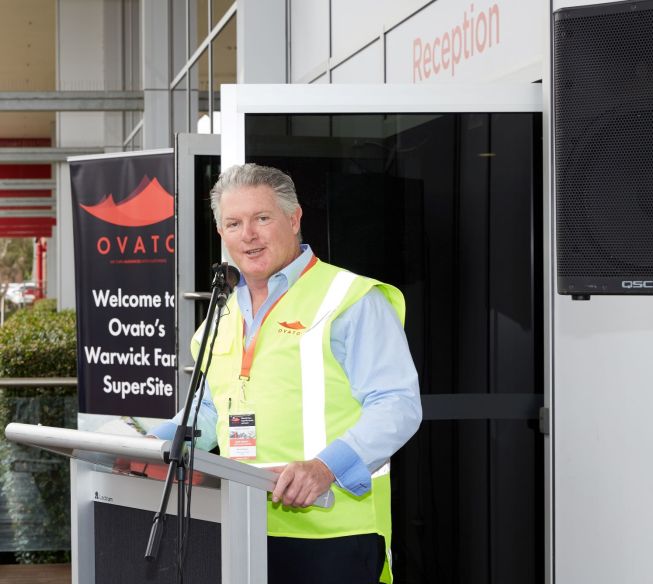
Ovato managing director Kevin Slaven says the controversial Scheme of Arrangement to keep one of Australia’s largest heatset print and distribution companies alive sets no precedent.
Ovato’s successful NSW Supreme Court bid to restructure and recapitalise has received strong criticism since its approval on December 21 last year.
There are concerns that the scheme will open the door for other companies to take similar action, while also making it harder for the broader print economy.
Four Ovato entities are now in liquidation and over 300 employees have been directed to the Fair Entitlements Scheme for their redundancy pay, while Ovato Ltd moves into its next phase.
A group of large creditors took a 50 cent in the dollar pay deal on outstanding invoices sparking concerns that they will seek to recoup these expenses elsewhere.
The printing industry is deeply concerned about what all of this means for other businesses with many concerned a dangerous precedent has been set.
The printers Sprinter has so far spoken to have not reported any significant changes with supplier agreements as yet, or changes to contract terms, but is always happy to hear from any printers that may have noticed a change.
If this sounds like you, please contact editorial@52.63.72.169.
No precedent: Slaven
In response to these concerns, Ovato managing director Kevin Slaven says the company had no choice with the action it took and that in doing so it saved 900 jobs, maintained supplier contracts and enabled it to continue to support downstream parts of the printing economy.
Slaven added the Scheme has not set any precedents.
“The Scheme sets no precedent because these were truly exceptional circumstances,” Slaven said in a statement provided to Sprinter.
“Ovato suffered $100 million losses last financial year as digital disruption continued to impact the industry before it had a chance to fully adapt.
“COVID accelerated the decline and in the second half of last year there was little cash in the company. Temporary laws that protected companies from insolvency were to expire on 31 December. The Scheme, in effect, shrunk the insolvency from a very large one to a much smaller one.
“Ovato is very terribly sorry that 300 workers had to be let go, but the alternative would have been disastrous for the company, its employees and the industry.”
Print & Visual Communications Association president Walter Kuhn, who spoke out against the Scheme in The Australian on January 11, disagreed with the statement that the approval has not set a precedent.
“Any results from court action will set a precedent for future court cases and that is a fact of law whether it be positive or negative,” Kuhn told Sprinter.
Kuhn has also questioned whether smaller operators, mum and dad print shops, would have been able to receive the same treatment if they had faced similar circumstances.
Kuhn says exceptional circumstances could be claimed in a number of circumstances given the situation with COVID-19.
Comment below to have your say on this story.
If you have a news story or tip-off, get in touch at editorial@sprinter.com.au.
Sign up to the Sprinter newsletter




Mr Slaven is demonstrably, head-in-the-sand WRONG! Ovato’s scheme HAS set a precedent. They are not a small suburban sheetfed printer, they are an ASX-listed firm, formerly the largest printer in Australia and now the 2nd largest. Therefore what they do is seen as setting an example – and a very poor one at that. Mr Slaven – it is not the fact that 300 redundancies were necessary – happens all the time. It is the WAY Ovato executed them. Last year, your company demanded and got the 300 staff to accept massive pay cuts. You then negotiated with the AMWU for further cuts in redundancy entitlements. Then you performed the dastardly act of deliberately making the four subsidiary companies virtually insolvent, with no reserves to pay those reduced redundancies. Now, through Duff & Phelps they ARE insolvent – their fees will take care of what was left in those ‘stalking horse’ companies. Nett result – send all former employees onto FEGS and the taxpayer, with a long wait for any funds. The hypocrisy of your ‘does not set a precedent’ comment is blatantly demonstrated by IPMG’s threat not to buy paper from any merchant supplying GEON when they sought a scheme of arrangement, eventually being wound up.
Why did IPMG threaten this boycott? Because GEON were setting a precedent that it’s OK to trade on, cost paper merchants and others millions, try to start again and then dump a thousand people onto FEGS. Now you have set a precedent that it is OK for an ASX-listed company, backed by very wealthy concerns, to strip subsidiary companies, liquidate them and dump 300 people onto FEGS. Printers have lost their houses and hopes for less!
Go ahead with your restructuring, but don’t insult the industry’s collective intelligence with your disinformation please.
“The Scheme sets no precedent because these were truly exceptional circumstances,” Slaven said in a statement provided to Sprinter.
DEFINITION FOR KEVIN TO CONSIDER
“an earlier event or action that is regarded as an example or guide to be considered in subsequent similar circumstances.”
This framework you signed off on set’s the precedent Kevin…